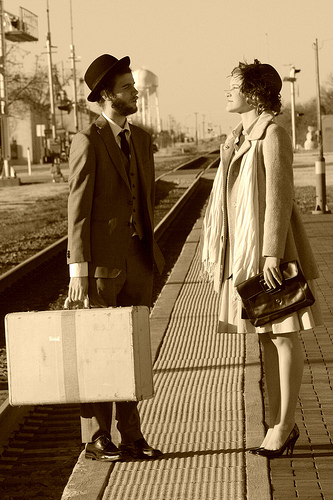
For My Father:
With a Suitcase in Each Hand

“They are Americans,” my father often explained about my brother and me while we were growing up. It was a pronouncement delivered in his thick Hungarian accent, and bestowed upon us with a jumble of love and pride, distance and dissonance. I remember that after long dinners at other people’s houses, with food we didn’t like, my brother and I would want to go to McDonald’s. The proof seemed to be in the pudding (or in the fries): my brother and I were quite different from our European father, who disapproved of our preference for fast food. But what strikes me now that I’m older is that usually our dad agreed, drove us to McDonald’s, and bought us hamburgers. He wanted us to be happy, and he wanted us to be Americans.
My parents escaped Communist Hungary in 1976, and settled in New Jersey. Today, my father’s stories from his first years as a new immigrant are as well-worn and beloved as a favorite song. There was the time he was driving back with a new hairdryer for my mother; he saw a sign that said “U-Turn Next”, and turned around because he didn’t know what the word “next” meant. (My mother wryly remarked in Hungarian, when my dad finally got home, “My hair is dry now.”) Or there was the time he arrived at a house for dinner and asked if he could see their closet. His hosts were confused, but obliged. Then it was my father who was confused—in Hungarian, a common word for “bathroom” is “vécé”, which is the Hungarian pronunciation of “WC”, which comes from the English phrase “water closet”… which is not used in the United States. He needed to pee and was looking at a bunch of hangers and coats.
When I was five, my dad—a chemical engineer—was relocated to a new position in Houston. My mother had recently and suddenly passed away, and so it was the three of us who moved: me, my brother, and my father. As I grew up, the impression I formed of my father was that being an immigrant means you don’t completely fit in either place; you are a foreigner in your new country, and you’ve also become a foreigner in the country from which you came. Once when my dad visited Hungary, he wanted to buy some grapes from a man selling them on the street. When my dad asked whether the grapes had seeds (since he was used to the variety in the States), the man snapped, “Of course they have seeds, you idiot!”
The way my father has always described his sensation of displacement in both places is that he’s “internationally homeless.”
3 comments on “For My Father:
With a Suitcase in Each Hand”
Comments are closed.




beautifully expressed julie.
Great, inspirational story….. “it’s never too late….”